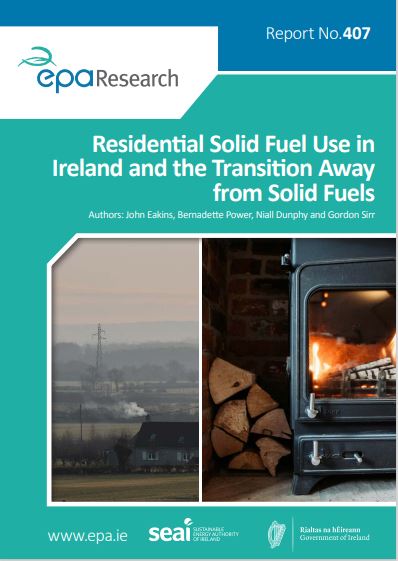Knowledge is power: how a better understanding of our home heating choices could save lives – New EPA Research Report (EPA Research 407) 28 Apr 2022

Authors: John Eakins, Bernadette Power, Niall Dunphy and Gordon Sirr
Summary: The EPA has highlighted air quality issues in urban centres in Ireland in recent years. Emissions of fine particulate matter (PM2.5), attributable to the burning of solid fuels, such as coal, peat and wood, are a particular cause of concern. This research project aims to provide a deeper understanding of the sector using existing and new sources of data on solid fuel use. The development of a new data set based on a survey of household heating and fuel use will be the primary contribution.
Project Highlights
Identifying Pressures
The Environmental Protection Agency has highlighted air quality issues in urban centres in Ireland in recent years. Emissions of fine particulate matter (PM2.5), attributable to the burning of solid fuels, such as coal, peat and wood, are a particular cause of concern. The complexity of the residential solid fuel sector, due to the heterogeneity of fuels being used and the lack of reliable and periodic data sources, hampers the task of developing effective policy solutions to support the continued transition away from the use of solid fuels for residential home heating. This research project aims to provide a deeper understanding of the sector using existing and new sources of data on solid fuel use. Some of the aims of the project include a more detailed examination of individual solid fuels; identification of the factors that determine the use of solid fuels, including the use of solid fuels as a “supplementary” fuel; and a quantification of the use of non-traded solid fuels, i.e. purchases made through informal markets or the own production and use of harvested peat, wind-blown trees or foraged wood.
Informing Policy
Recent government policy responses in this area include the announcement of new nationwide minimum environmental standards on residential solid fuels and a public awareness campaign to reduce air pollution from residential fires. Evidence from other countries suggests that a range of different policies measures, including retrofitting, tax measures and further awareness of the negative effects of using solid fuels, will be required to support an effective transition away from the use of solid fuels. The implementation of these measures should be made in a stepwise fashion, making improvements to the current situation. Accounting for the heterogeneity of the different solid fuel users, and especially the differences between primary and supplemental solid fuel users identified in this report, is an important aspect of the design of policy. Consideration should also be given to the potential for substitution to the non-traded solid fuel market. This report has highlighted the significance of the non-traded market, particularly for certain solid fuels, such as peat and wood, and for households in rural areas.
Developing Solutions
The analysis of existing data sets, a survey of residential solid fuel users and interviews with selected solid fuel users have provided valuable insights. The heterogeneity of solid fuel users in relation to household characteristics and levels of use is one aspect that has not been presented in research before. New data on supplementary solid fuel use can help to strengthen the understanding and management of air quality in Ireland. Another contribution of the survey of solid fuel users has been to highlight the significance and scale of the non-traded solid fuel sector and increase our understanding of who engages in its use. A periodic survey of a nationally representative sample of households going forward would be beneficial in capturing trends in this sector and household solid fuel use in general. Such a bottom-up approach would complement the top-down methods used by the Sustainable Energy Authority of Ireland in its energy balance statistics. A periodic survey would also provide a baseline against which progress in relation to policies implemented could be measured and tracked.
